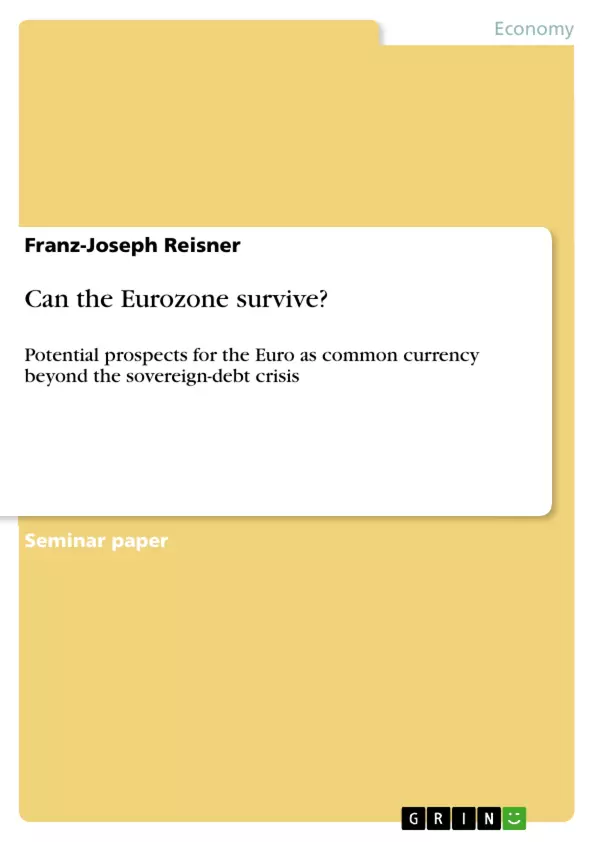This report critically evaluates and addresses the past, current and the possible future situation of the Eurozone. To consider the question of whether the Eurozone will be able to survive, the first part of this report provides an overview of past developments regarding the Euro, and how the Euro’s complex history has led to the current situation, including potentially contributing factors to the crisis. The second part then focuses on the present situation: Greece causing the potential threat of a rapid domino effect that could splinter the Eurozone as a whole. Subsequently, this report evaluates if the measures, imposed by the EU, ECB and IMF will be adequate to finally resolve the crisis, before focusing on the potential future of the Euro as a common currency for Europe.
Inhaltsverzeichnis (Table of Contents)
- Index of Abbreviations
- Introduction
- Analysing the past
- The Present: Contributing factors and relevant players
- Future expectations beyond the sovereign-debt crisis
- Conclusion
- Bibliography
- Appendix
Zielsetzung und Themenschwerpunkte (Objectives and Key Themes)
This report critically evaluates and addresses the past, present and potential future situation of the Eurozone. It examines how the Euro’s complex history has led to the current crisis and explores the potential for the Euro to survive as a common currency for Europe.
- The historical context and development of the Euro
- The impact of the 2008 economic crisis on the Eurozone
- The role of Greece in the current Eurozone crisis
- The effectiveness of EU, ECB, and IMF measures in addressing the crisis
- The future prospects for the Euro as a common currency
Zusammenfassung der Kapitel (Chapter Summaries)
The report begins by outlining the origins of the Euro in the early 1970s, tracing its development from the collapse of the Bretton Woods agreement through the introduction of the Exchange Rate Mechanism (ERM) and the signing of the Single European Act. The chapter highlights the political and economic motivations for creating a single currency, emphasizing the role of the Deutschmark in achieving monetary stability.
The report then focuses on the present situation, examining the impact of the 2008 economic crisis on the Eurozone and the potential threat of a domino effect caused by Greece's financial difficulties. The chapter explores the risk of contagion to other peripheral countries and the implications of a potential Greek exit from the Eurozone.
Schlüsselwörter (Keywords)
Eurozone, Euro, sovereign-debt crisis, Greece, PIIGS, European Union (EU), European Central Bank (ECB), International Monetary Fund (IMF), Exchange Rate Mechanism (ERM), Bretton Woods agreement, Stability and Growth Pact (SGP), Deutschmark, monetary stability, economic crisis, contagion, Grexit.
Frequently Asked Questions
What are the historical origins of the Euro?
The Euro's origins date back to the early 1970s, following the collapse of the Bretton Woods agreement, leading to the Exchange Rate Mechanism (ERM) and the Single European Act.
How did the 2008 economic crisis affect the Eurozone?
The crisis exposed structural weaknesses in the Eurozone, leading to a sovereign-debt crisis and threatening the stability of the common currency.
What role did Greece play in the Eurozone crisis?
Greece's financial difficulties caused a potential domino effect (contagion) that threatened to splinter the Eurozone and raised the possibility of a "Grexit."
Are the measures by the EU, ECB, and IMF effective?
The report evaluates these measures, analyzing whether they are adequate to resolve the crisis and ensure long-term monetary stability.
What is the Stability and Growth Pact (SGP)?
It is a set of rules designed to ensure that countries in the European Union pursue sound public finances and coordinate their fiscal policies.
- Quote paper
- Franz-Joseph Reisner (Author), 2014, Can the Eurozone survive?, Munich, GRIN Verlag, https://www.grin.com/document/293078



